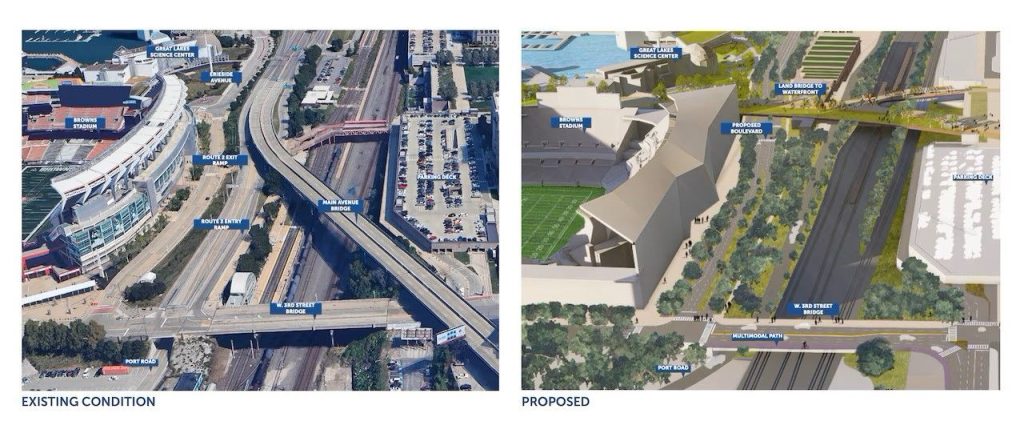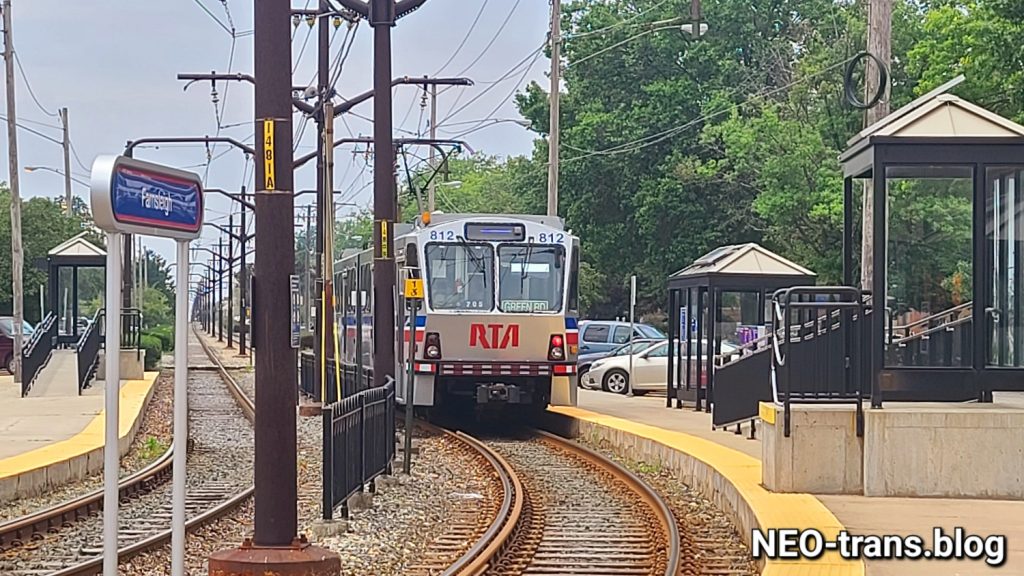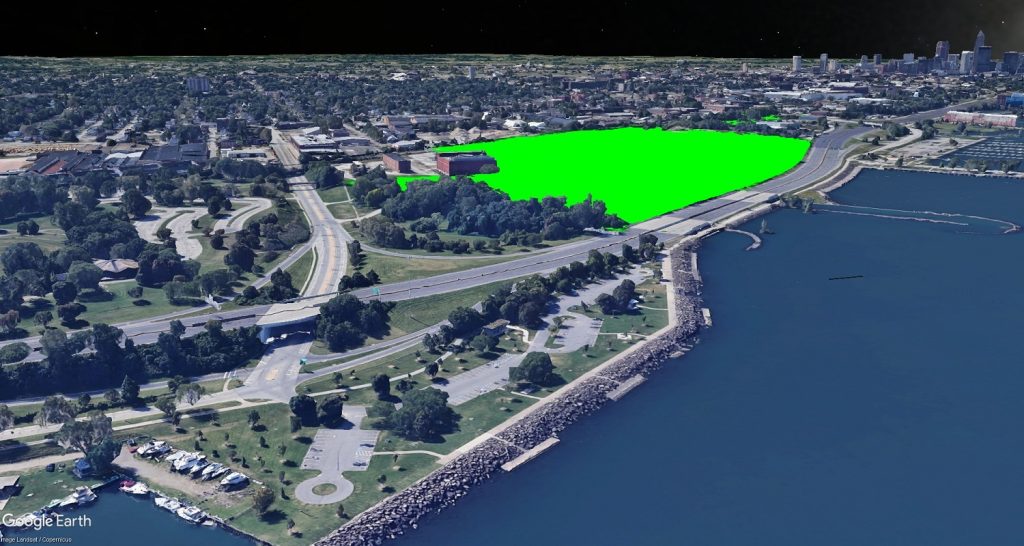
Redesigning the Shoreway highway through Downtown Cleveland is a major infrastructure project that recently was awarded millions in federal funds. The fate of that and other funding to local infrastructure and energy projects may be in doubt due to a 90-freeze and agency review mandated by the Trump Administration (FO). CLICK IMAGES TO ENLARGE THEM.
Infrastructure, energy projects delayed or canceled

Millions, if not hundreds of millions of federal tax dollars awarded to local infrastructure and energy projects may be at risk from a 90-day funding freeze and review mandated earlier this week by the new Trump Administration. That possibility was raised today at the first board meeting of the year for Greater Cleveland’s metropolitan planning organization (MPO) which distributes federal funds to transportation and air quality programs.
Right now, the biggest issue is uncertainty resulting from an executive order called “Unleashing American Energy” signed by President Donald Trump on his first day in office Monday, said Grace Gallucci, executive director of the Northeast Ohio Areawide Coordinating Agency (NOACA). While Trump has taken specific aim at electric vehicle incentives and renewable energy, the move will also pause funding for infrastructure and transportation projects.
Funding for those and other local transportation investments came from the five-year (2022-26) Infrastructure Investment and Jobs Act (IIJA) of 2021 that supports transportation projects. Also subject to agency review are awards made under the Inflation Reduction Act (IRA) of 2022 targeting the federal government’s budget deficit, lower prescription drug prices and invest in domestic energy production while promoting clean energy.
“This may impact NOACA although we’re not quite sure yet how,” Gallucci told the NOACA board. “But it does mandate a 90-day freeze on certain IIJA and IRA disbursements. NOACA is monitoring this very closely through our trade associations and our other MPOs across the country. We’re particularly looking for clarification on the scope of the funding freeze. It may cause some delays for capital projects. And it may impact discretionary funding opportunities that are upcoming.”
Any federal funding award not already under contract with its local sponsor, such as the Ohio Department of Transportation (ODOT), Greater Cleveland Regional Transit Authority (GCRTA) or city of Cleveland, for example, could be pulled back if the federal agency administering that funding award determines it doesn’t meet the administration’s policies.
“During the 90-day review period, each agency will assess the consistency of its processes with the new policy and submit recommendations to both the director of the National Economic Council (NEC) and the director of the Office of Management and Budget (OMB),” Gallucci added. “Disbursements may resume only if deemed consistent with any adopted recommendations.”
Recent federal funding awards not yet under contract include a $69.3 million grant by the U.S. Department of Transportation to the city of Cleveland for revamping the Shoreway highway through Downtown Cleveland into a multi-modal boulevard with intersections. That augmented a prior grant award of $59.7 million in October which is to be distributed to the city in installments over two years.
Cleveland, other cities, counties and ODOT in Northeast Ohio have received hundreds of millions in federal funds for road and bridge projects. In 2024, 38.5 cents out of every dollar spent by the federal Highway Trust Fund (HTF) came from discretionary general taxes. This was due to a deficit of $26.7 billion between the HTF’s spending and its net highway user tax revenues like gas taxes which haven’t been raised in more than 30 years.
“We have not been notified that any awards are being frozen or rescinded,” said Sarah Johnson, chief communications officer at Mayor Justin Bibb’s office.
Another potential impact could be to GCRTA. It won $16 million from the Federal Transit Administration last year to rebuild all of its Blue Line light-rail stations in Shaker Heights and is seeking another $16 million to rebuild aging stations on the Green Line, too. It also is using millions in federal money for other stations, track, new buses and infrastructure work system-wide.
And, GCRTA is seeking to round out its desired order of 60 light-rail trains to replace its 40- to 45-year-old railcar fleet. It has $355 million on hand, thanks in part to a $130 million federal grant — GCRTA’s largest ever — to order 48 trains so far. But GCRTA wants another $38 million from state and federal funds to achieve its full order so it has a reserve of spare trains for maintenance cycling and special events.
“I am not aware of any grants to GCRTA being frozen or rescinded,” said GCRTA Public Information Officer Robert Fleig.
Gallucci reassured NOACA’s board and staff that the funding freeze is unlikely to impact the planning organization’s staffing and operations. The reason, she said, is because NOACA maintains a funding reserve to protect against any financial hiccups.
“We have well above sufficient funds to continue for 90 days in our operations should that be impacted in any way,” Gallucci explained. “We’re not sure what’s impacted but if we are impacted in terms of covering the scope of that executive order we will be able to withstand the 90 days of operating expenses until that research is done by the White House.”
According to Section 7 of the presidential order, federal agencies must suspend IIJA and IRA grants, loans and other financial mechanisms, including those supporting electric vehicle infrastructure, until they complete a 90-day review to ensure alignment with the administration’s energy policy.
At this stage, it remains unclear whether the pause covers all prospective funding, such as direct pay provisions under the IIJA and IRA, or if it applies solely to grants, loans and contracts administered at the federal level. Pausing funding already appropriated by Congress may prompt legal challenges, though the administration can impose interim review processes. Any resulting delays could affect organizations and projects depending on future allocations under these statutes.
Under former President Joe Biden, federal agencies awarded $210.9 billion of IRA and IIJA grant funding, and awardees are now implementing projects. The incoming administration campaigned on reducing government spending and Trump announced plans to terminate unspent IRA funds.
END






